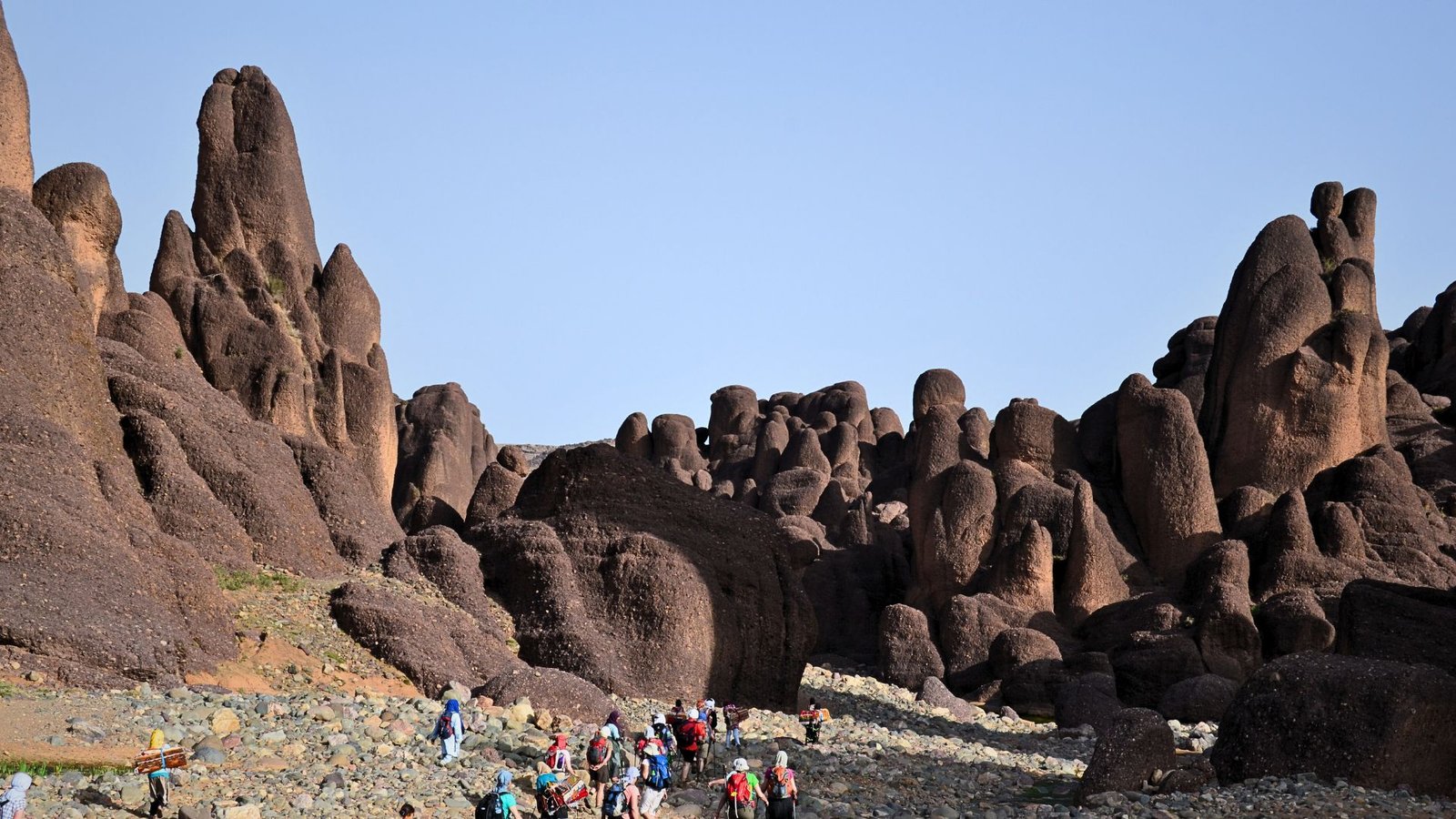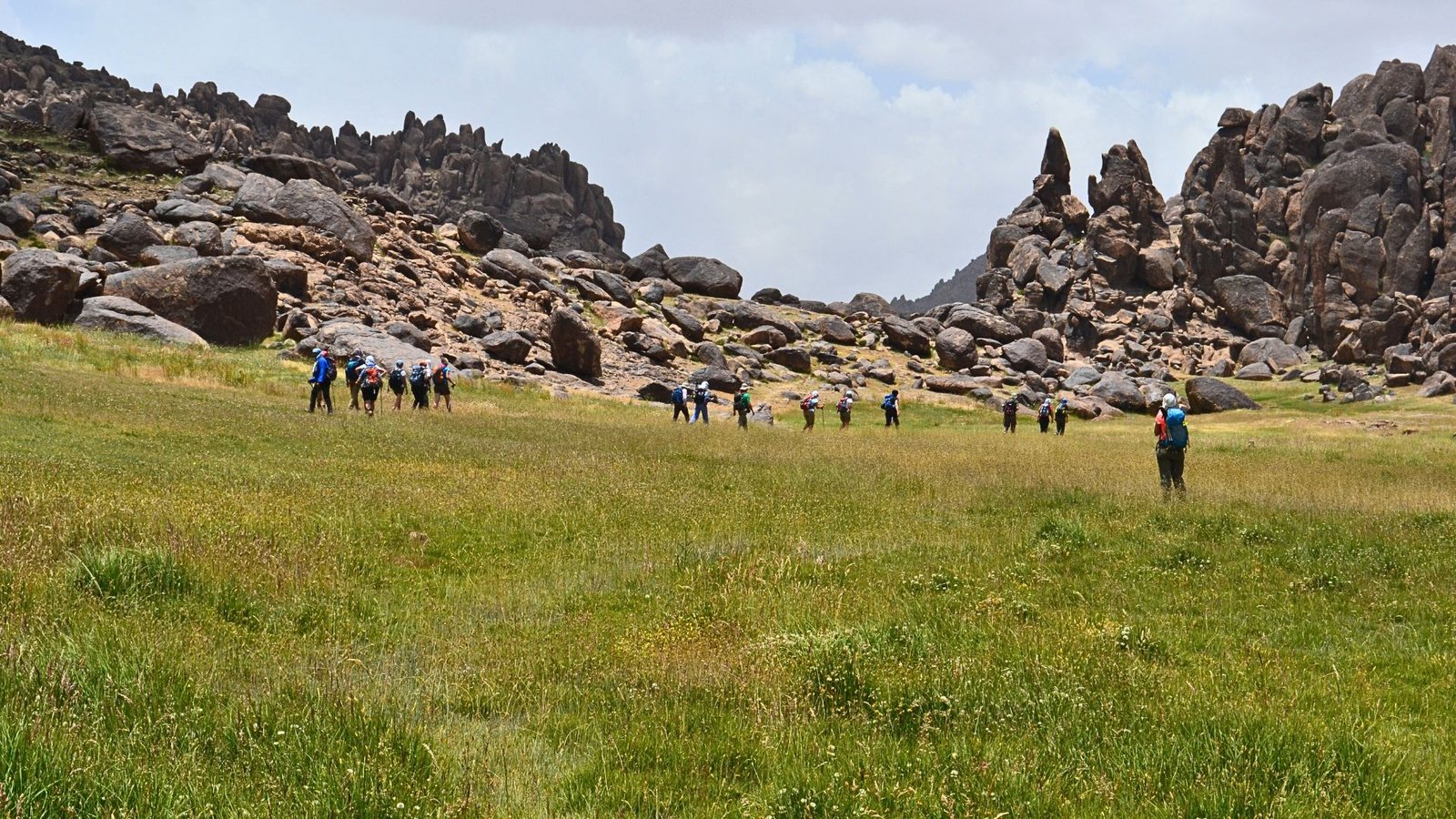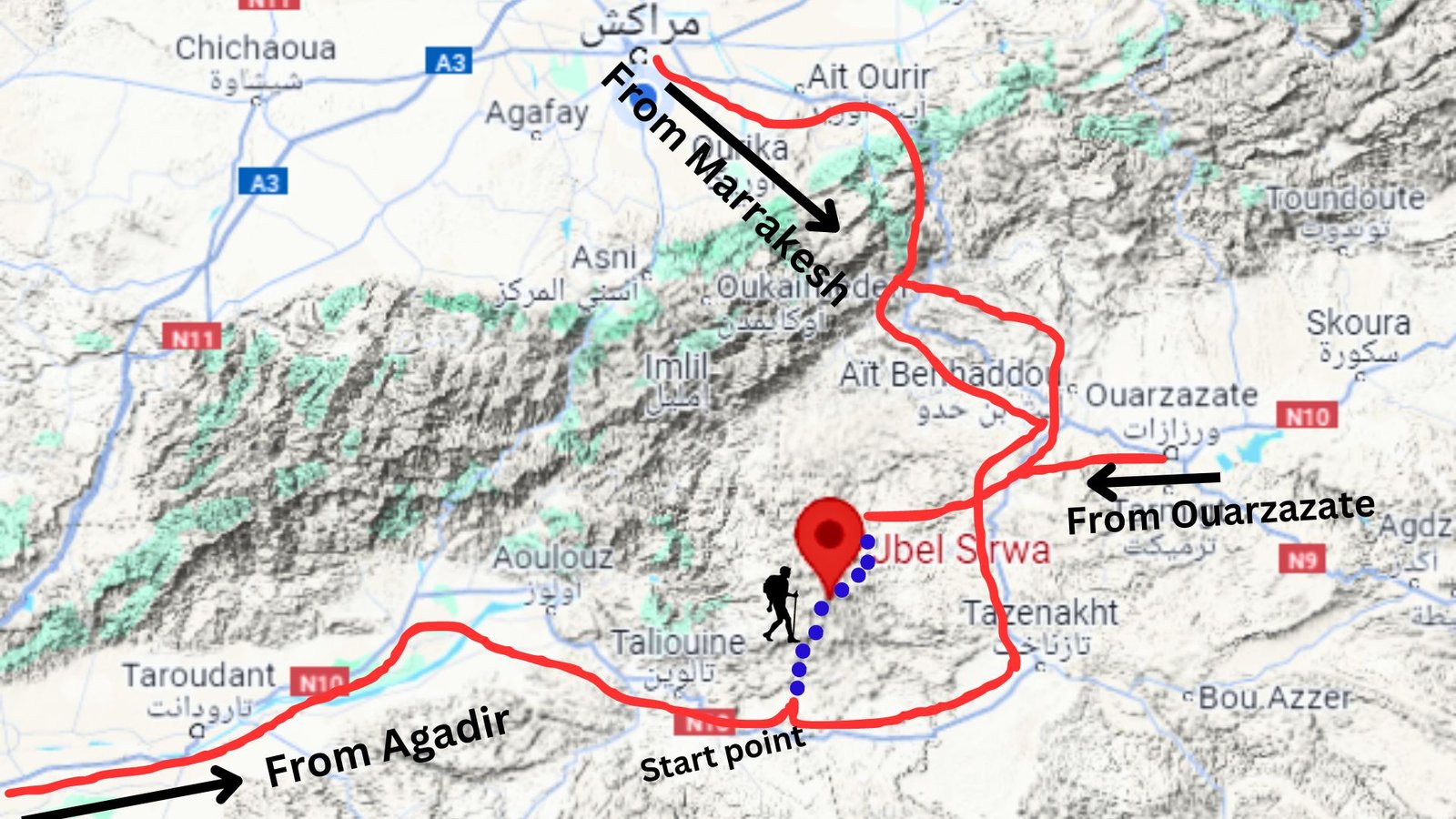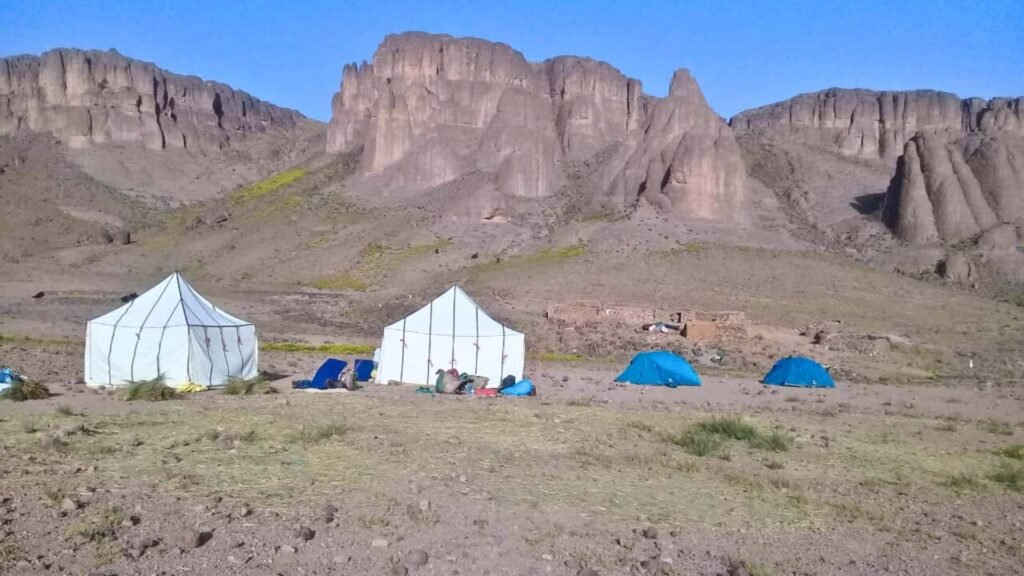




Mountain Siroua trek Morocco or Jebel Siroua trekking is an itinerary created by our extensive experience to guide you amidst the rugged landscapes formed between the High Atlas Mountains and the Anti-Atlas, the dormant volcanic expanse of Jebel Sirwa offers a picturesque setting unlike any other in Morocco. This region is a captivating blend of nature’s wonders, featuring expansive fields of saffron, meadows adorned with a riot of colorful flowers, quaint stone villages, and awe-inspiring vistas. Amidst this breathtaking scenery, the area is also home to the distinctive Ait Ouaouzguit Berber tribe, adding a cultural richness to the already enchanting tapestry of the Jebel Sirwa.
A wonderful trek will take you into the Jebel Siroua mountains, where you can experience a sense of wilderness and breathe the clean air of the peaceful valleys, surrounded by colorful foothills, mineral mountains and green valleys where the Berber inhabitants have kept the best of their ancestral traditions.
While traveling in the depths of these peaceful mountains and to accomplish a nice trekking to Jebel Siroua, we will hike through impressive landscapes on well-marked trails, surprisingly not too strenuous and along the way, we will pass through remote villages and terraced fields offering you an insight into the daily life of the hardy and friendly Berber people. This trip stamps its imprint on your soul like nowhere else on earth.
| GROUP SIZE | 2 | 3 | 4 | 5 | 6 | 7 | 8+ |
| PRICE/PERSON | €980 | €930 | €880 | €830 | €780 | €750 | €790 |
Jebel Siroua, also known as Jebel Sirwa, is a mountain range in the Anti-Atlas region of Morocco. Trekking in Jebel Siroua offers a unique and challenging experience, allowing you to explore stunning landscapes, Berber villages, and rich cultural heritage. Here's what you can expect when trekking in Jebel Siroua:
This ample experience that we will share with you will undoubtedly guide you to an unforgettable tour in Morocco.
Upon your arrival at Marrakesh/Ouarzazate airport, you will be welcomed by your tour guide and transferred to your riad or hotel for an overnight stay. If you arrive early enough, you can visit some of Marrakesh’s beautiful monuments, the famous Jamaa Lafna square, and take a stroll in the bustling markets of the Medina.
Embarking on a breathtaking day excursion to Ouarzazate, after a spectacular drive over the Tizi-n-Tichka Mountain pass 2260 meters, our adventure continues as we delve into the enchanting Ounila Valley region. Here, we’ll embark on a captivating 3-hour hike, immersing ourselves in the stunning landscape and delving into the rich history of this fertile valley. The Ounila Valley is renowned for its picturesque mud-brick buildings and ancient Kasbahs, each structure telling a tale of bygone eras.
The hike not only promises awe-inspiring views of villages but also offers a glimpse into the traditional way of life in this secluded haven. Amidst this natural beauty, we’ll take a pause to savor an authentic lunch, graciously hosted by a local family, providing us with a taste of the region’s warm hospitality and culinary delights. Our road continues with a scenic drive to the fortified village of Ait Ben Haddou, an architectural marvel that has earned its place on the prestigious UNESCO World Heritage list. This ancient village, with its labyrinthine alleys and imposing Kasbahs, stands as a testament to centuries of history and culture. Ait Ben Haddou has also etched its name in cinematic history, serving as the backdrop for iconic Hollywood films such as Gladiator and Lawrence of Arabia, adding a cinematic allure to its already captivating charm.
After the visit of Ksar Ait Benhaddou we continue to our destination of Ouarzazate. dinner and overnight stay in Hotel.
After breakfast, we depart from Ouarzazate and head west. Your odyssey will take you through the otherworldly town of Taznaght, across a vast lunar plateau, arid mountains, and along a 6 km track. We eventually reach the meeting point with our team, where we begin a walk on flat ground through the valley and Tisslet gorges. We’ll arrive at our first camp at 1400 m after a 3-hour walk. Enjoy dinner and an overnight stay at the camp.
We start our day with the enchanting exploration of the Tisslite gorges, immersing ourselves in the awe-inspiring beauty of nature’s intricate creations. As we venture further, the Tizgui Valley unfolds before us, adorned with a tapestry of quaint villages and meticulously sculpted terraced fields, painting a picturesque scene that captures the essence of traditional Berber life.
Our siroua trek leads us to the heart of the Tizgui Valley, where we are greeted by the magnificent attic of Tizgui—a true testament to the architectural and cultural richness of the region. The intricate details of this superb attic provide a glimpse into the history and heritage that thrives within these mountainous landscapes.
With a sense of wonder, we continue our walk, ascending to the lofty altitude of 2200m, where our camp awaits at 2200m.
We bid farewell to our picturesque campsite nestled in the heart of Tizgui and embark on an enchanting trek towards the Tisswitine pastures. As we traverse the lunar-like landscape, our path meanders through the timeless beauty of the terrain, passing by numerous sheepfolds that serve as temporary havens for the nomadic communities during the balmy summer seasons.
The sun casts its golden hues upon us as we reach our destination: a serene campsite nestled at the foot of the majestic Jebel Siroua, near the Tisswitine sheepfolds standing tall at an elevation of 2600 meters. Upon our arrival at this idyllic spot around 1 o’clock, there is the optional opportunity in the afternoon to immerse yourself in another two hours of walking, enhancing your connection with the mesmerizing landscape.
Breakfast will be taken early in the morning, accompanied by the crisp mountain air, invigorating our senses for the adventure that lies ahead.The trail to the summit unfolds gradually, revealing the beauty of Jebel Siroua at every turn. The ascent is not steep, allowing us to walk at a leisurely pace, immersing ourselves in the natural wonders that surround us.
As we ascend, the landscape undergoes a magical transformation. The panoramic views of the High Atlas mountains unfold, presenting a breathtaking spectacle that captures our imagination. Valleys stretch out beneath us, their contours defined by time and nature. The summit becomes our vantage point, offering an awe-inspiring panorama that extends as far as the eye can see. This moment of repose allows us to appreciate not only the physical Siroua trek but also the spiritual connection forged with the mountains.
After our summit conquest and shared moments of reflection, we begin our descent, retracing our steps toward the camp nestled in the quietude of the large shepherds’ houses and sheep folds (Azib) of Irri at 2000m.
We eagerly depart from our camp, anticipating a day filled with awe-inspiring experiences amidst nature’s grandeur, our footsteps lead us over the majestic pass of Azwou 2450 m. The panoramic views from this vantage point unfold before us, revealing a tapestry of breathtaking landscapes that captivate the senses.
Our path meanders through expansive grazing lands and lush green pastures, creating a picturesque backdrop for our trek. The gentle rustling of the wind and the rhythmic cadence of our footsteps accompany us as we immerse ourselves in the serenity of the surroundings.
In the latter part of the afternoon, our exploration takes us to the enchanting large shepherds’ houses and sheep folds of Aziwan, where nature has sculpted spectacular volcanic rocks, each telling a silent tale of geological wonders. The interplay of light and shadow accentuates the unique formations, providing a mesmerizing spectacle that invites contemplation and admiration. Optionally, in the afternoon, it’s possible to head for a couple of hours walking into this mesmerizing and particular landscape.
After enjoying our final breakfast while camping, we set off to enjoy an easy half day trek. The footpath takes us down to the village of Amassin, where our Jebel Siroua trek concludes with a visit to a historic granary. After a short break with mint tea, we head to our lunch spot outside the village. Following lunch, we have a direct transfer back to Marrakech.
From the quaint oases of southern Morocco to the towering High Atlas Mountains, we drive through amazing landscapes, crossing the famous Tizi-n-Ticka pass at 2260 meters. We arrive in Marrakesh late in the afternoon.
Visit Marrakesh, a vibrant city in Morocco known for its rich history, stunning architecture, and bustling markets. Located in the western part of Morocco near the foothills of the Atlas Mountains, it was founded in 1062 by Abu Bakr ibn Umar.
Meet your city tour guide for a half-day tour at 09:30 and start visiting some of the highlights of Marrakesh’s old city, such as Bahia Palace, Medersa Ben Youssef, souk (market) with handmade artisan crafts, Pasha Museum. The visit concludes by exploring the main square of Jamaa Lafna.
In the afternoon, you can experience the traditional Moroccan bathhouses known as hammams for relaxation and cultural immersion at your own expense.
Meeting you and transfer to the airport 3 hours before your fly time.
We’ve gathered a selection of commonly asked questions to provide you with further insight into this extraordinary trek.
All meals are included during this Jebel Siroua trek from breakfast on Day 2 to Lunch on Day 8.
Drinking untreated water from the taps is discouraged. It is advisable to use purification tablets or a filter bottle (such as a Water-To-Go bottle) to treat your water, or purchasing mineral water as alternatives.
During the trek, all food is sourced locally and prepared by our skilled trek cooks. Our cook and crew consistently amazes Morocco hike tours groups with their culinary creations!
Breakfast, tea, coffee, milk, chocolate… jams, honey, cheese… bread, sometimes Berber pancakes.
Lunches usually starts with a cup of mint tea, assorted salads, and a hot dish, fruits,… (Vegetables are washed, peeled).
Dinner, starts off with soup and bread. The main course is usually rice, pasta, couscous, spaghetti or chips, with a vegetable stew (or tagine) consisting of some of the following – onion, potato, carrot, green pepper, zucchini, turnip, parsnip, green beans, and peas. There will be some meat (usually chicken, lamb or beef), however meat is not prominent in the menu. All dishes come with traditional sauces which are rarely (spicy) hot. To round off dinner, there is the usual range of hot drinks and some fruits.
While we make efforts to accommodate vegetarians, the options may be limited at times. Unfortunately, we may not always be able to accommodate special dietary needs due to the nature of our trips and the area we visit. It can be challenging, and in some cases impossible, to cater to a wide range of dietary preferences. You may need to bring supplementary food or snacks from home if your dietary needs are specific. For inquiries about specific dietary requirements, please contact our sales team. Please understand that we cannot guarantee to fulfill all requests and cannot be held liable for any issues related to dietary restrictions or intolerances.
During this Mount Siroua trek, the group will spend two nights in a riad or hotel in Marrakesh on an en-suite basis. While there are a range of high-end hotels in Marrakesh, we try to strike the right balance of a comfortable and conveniently located base while maintaining a really good value holiday.
While trekking, we have 4 nights in a mobil and wild camp and one night in Lodge.
If you are traveling by yourself, you will be paired up with another single client of the same sex. Single hotel rooms and/or single rooms and single tent are available for a supplementary cost. If you are planning on extending your holiday, additional nights at the group hotel or in a range of different hotels and riads in Marrakesh are available on request.
The group will be led by a professional and qualified tour leader proficient in English or another language of your preference, depending on the confirmation date. Additionally, the group will be supported by a full trek crew, which includes a cook responsible for preparing our meals, as well as baggage animals (mules), and their handlers..
This Jebel Siroua trek involves going to moderately high altitude. During the course of this trek you will reach altitudes in excess of 1800 metres. We recommend you read the advice on trekking at high altitude. You can also talk to one of our trekking experts if you have any concerns about altitude.
Plan to hold around £150 per person (or its equivalent in US dollars or Euros) for tips, soft drinks, snacks, and other incidental expenses. Keep in mind that additional costs may arise for souvenirs, and optional activities, so it’s wise to budget for these separately.
While Moroccan Dirhams are not typically available for purchase outside the country, you can conveniently withdraw local currency from ATMs upon your arrival at the airport or in Marrakech. ATMs offer the option to withdraw funds in pounds sterling, dollars, or euros, which you can easily exchange at the airport. Carrying a credit card is advisable for emergencies and additional peace of mind.
Tipping is the customary way to express gratitude to your local guides and porters. It’s important to note that tips do not constitute a part of their wages; rather, they are viewed as a personal gesture of appreciation from group members. We advise our local teams that tips are not obligatory or expected but are rather a reflection of the service provided.
It is customary for the group to collectively decide on the final amount of tips to be distributed among the guide, cook, and porters, as their responsibilities differ. We suggest that approximately £55 per group member would be an appropriate amount to ensure fair compensation, which you can give directly to them.
For this Jebel siroua Trekking from Marrakesh, you should bring one piece of luggage (maximum weight on arrival at the group hotel is dependent on your international flight restrictions) and a daypack (of around 30 – 40 litres). no rigid suitcase, for your belongings (top opening, more practical); your bags will be handled several times and carried by the mules. (Maximum 15kg/person), and no fresh produce should be left in these bags.
You can, of course, leave any type of baggage at the hotel in Marrakesh or Ouarzazate city, including any items you do not need on the trek, as well as your suitcase if you prefer to travel with it, and pick these up when you return.
Your main bag will be transferred between overnight stops, and you should have this ready for collection before breakfast each morning. The bag will normally be delivered to our next camp by 16 :30, but this may vary depending on the day.
Upon your arrival at the airport, you can purchase a SIM card for 1 euro, or sometimes it’s free. Then, all you need to do is top it up with an internet option, and you’ll have a connection when needed. We recommend Maroc Telecom as the company, but please keep in mind that in some places, other companies might offer better service. It all depends on the reception in each area.
All our trekking and tours proposals in Morocco by Morocco hike tours are guaranteed for a minimum of two people. There is a required minimum number of participants to ensure the trip proceeds. Once this minimum number is reached, the trip status will change from ‘Available’ to ‘Guaranteed to run
If you suffer from a severe allergy, kindly notify the Morocco Hike Tours Team (support) prior to your departure. While we will make every effort to assist you, please note that we cannot ensure an allergy-free environment during Your trip to Morocco. It is imperative that you carry your own allergy treatment, as ‘adrenaline auto-injectors’ are not provided as standard equipment by Morocco Hike Tours leaders and staff. Upon arrival, please inform your leader about your allergy and indicate the location where you store your adrenaline pen.
Vaccinations: It’s advisable to reach out to your physician or travel clinic to verify if any particular vaccinations are necessary for your trip.
Your passport must meet 2 requirements. It must be:
Travelers hailing from the UK, US, and EU typically enjoy visa-free access to Morocco. However, it’s essential to bear in mind that visa regulations can undergo alterations. Ensuring compliance with visa prerequisites falls under your purview for this journey. Hence, we advise consulting the closest embassy or consulate pertaining to your designated destination(s), as well as any countries involved in transit or transfer.
Certain local authorities furnish information regarding the requisite visas for their nationals. To assist you further, we’ve compiled a set of helpful links below:
Preparing with some extra physical activity prior to embarking on an active vacation is highly advisable. Enhancing your fitness level beforehand will undoubtedly enhance the overall enjoyment of your trip.
Being in good physical condition and accustomed to walking for 3 to 5 hours on consecutive days is recommended. Engaging in hill walking, incorporating both ascent and descent, serves as optimal preparation. Additionally, activities such as running, cycling, and swimming are beneficial for improving cardiovascular endurance and stamina.
Morocco’s monetary unit is known as the Moroccan Dirham. Below are some currency exchange rates, which can fluctuate daily:
– 1 Pound Sterling = 12.5 Dirham
– 1 Australian Dollar = 6.5 Dirham
– 1 Canadian Dollar = 7.4 Dirham
– 1 US Dollar = 10.00 Dirham
– 1 Euro = 10.6 Dirham.
If you wish to have your clothes washed during your stay in Morocco, it will be possible for an additional fee of 10 Dirhams per item (underwear not accepted) and 4/5 Dirhams per item for ironing.
During this Jebel Siroua trek, the weather typically offers pleasant conditions with daytime temperatures ranging between 20 and 36°C, and nighttime temperatures dropping to 7 – 10°C. However, there are instances when nighttime temperatures may plummet to as low as 3°C, so remember to pack a fleece jacket. While rainfall is uncommon in this area of Morocco, being a mountainous region, it's wise to be prepared for occasional showers.
Morocco Hike Tours does not encourage the use of single-use plastic items. We ensure that all our staff across Morocco work together to reduce this issue and educate those around them. During our desert and mountain treks, we are committed to collecting our rubbish and bringing it back to the big cities. Our footprints are the only thing we should leave behind.
To participate in a holiday organized by Morocco Hike Tours, it is imperative that you possess a valid travel insurance policy. This insurance should adequately cover the expenses related to medical treatment and safeguard the value of your holiday in case of cancellation. Prior to obtaining insurance, please verify that the chosen policy provides coverage for the activities and altitudes specified in your itinerary.
In the event that one participant leaves the group for any reason, the customer must assume responsibility for the charges, and no reimbursement will be provided.
This trek operates during April, May, June, October, and November, and is flexible to depart on any date of your preference within these months.
This trek offers the option to combine with the Sahara desert sand dunes sand dunes during March, April, May, and November.
Please select the trek that piques your interest, then reach out to us via email to initiate a discussion regarding your preferred trek and to verify its availability. Once we have agreed upon the specifics of your trek, including its duration, route, and the number of participants, we will proceed to make a tentative reservation, providing you with the dates and associated costs.
To secure your booking, we kindly request a 20% deposit, which can be paid online through a bank transfer in Euros, pounds sterling, or US dollars. The remaining balance is settled upon arrival in Morocco, payable in cash using the same currencies—Euros, sterling, or dollars—at the outset of the trek.
Please note: Should you find it inconvenient to carry cash, you have the option to settle the balance online via bank transfer a few days prior to the departure date.
Our Cancellation Policy:
In areas with low tourist numbers (Berber villages in the desert such as in the Atlas), men are advised to avoid very short shorts, tank tops or loose shirts. The same goes for women, avoiding transparent fabrics and tight-fitting outfits. A scarf on your hair is not essential. You can try to dress in local fashion, which seems better suited to the climate.
This packing guide aims to assist you in organizing your belongings efficiently. It’s advisable to aim for minimal weight when packing your equipment.
Please ensure you have the following items with you:
You have the choice to opt for the following items:
Item to rent:
Sleeping bag: €25 per person
Single tent: €30 per person
Private Camel Ride: €150/p
Car rental: from €40, lease this via Morocco Hike Tours.


Register now! We will send you best offers for your trip.


Jim Macfarlane
We did the 6 day, 5 night trek with Morocco Hike Tours across Jebel Siroua, from south to north, from the village of Skoumt to the village of Amassine. Omar was our guide, with Hassan as cook, Abdul and Khaleed as muleteers and 3 mules. We flew in to Ouarzazate and flew out from Marrakesh. We are a family of 4 – children 12 and 14, from UK. This was an absolutely unforgettable, amazing experience for us all. Omar and his team were incredibly kind, attentive, interesting and fun throughout the whole trip, from start to end. Jebel Siroua is a fascinating and beautiful area – in October we did not see any other trekkers for the whole time, but met a lot of friendly Berber villagers in their high pasture homes (azibs) harvesting saffron, fruit and looking after their goats and sheep, before the winter. Hassan organised the whole trip for us. The price was accurate and very fair. Everything went completely to plan! We would highly recommend organising your trek or tour directly with Morocco Hike Tours. You will get very high quality and a fair and honest price, compared to any UK/foreign tour company, you will pay significantly less and get a more authentic and enjoyable experience. Jim, Claudia, Iona and Sam. Newcastle, UK